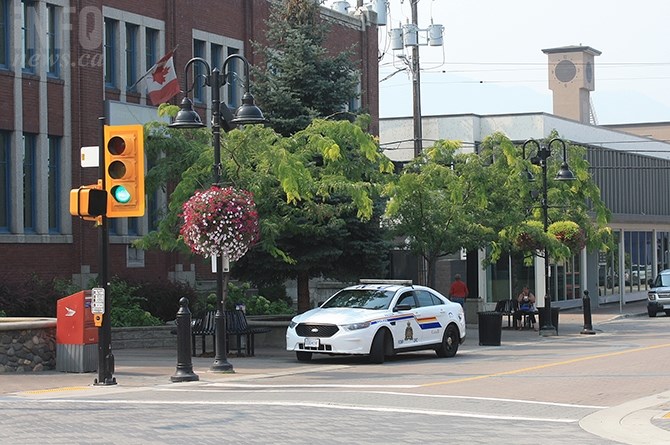
Despite paying an additional $47,000 for RCMP overtime, $42,000 in additional security lighting and $40,000 more for bylaw services, among other expenditures, City Administrator Peter Weeber said the problems with anti-social, lawless behavior and public drug use continues in the city.
(STEVE ARSTAD / iNFOnews.ca)
September 04, 2018 - 4:19 PM
PENTICTON - The City of Penticton has spent more than $350,000 this summer in its ongoing campaign to clean up city streets and make downtown safer - with little to show for the expenditure.
Chief Administrative Officer Peter Weeber updated City Council at the Committee of the Whole meeting this afternoon, Sept. 4.
Weeber says the city has spent $352,600 to date on the issue. Expenditures include $20,000 for needle pickup, $57,000 in public washroom repairs, and $90,000 in private security expenses.
A public relations campaign known as "See something, say something" has cost the city $5,000 to date, and clean up of the troublesome residence at 377 Winnipeg cost a further $25,000.
The city’s efforts began with a declaration early in July “the party was over” for those who are intent on causing criminal or social issues in the city.
Penticton has added new security lighting downtown, moved park benches, trimmed trees in public areas, in addition to concerted efforts by the city’s bylaw enforcement department to move people along as part of the city’s campaign to stop anti-social and illegal activities blatantly taking place on city streets.
But in spite of stepped up efforts by police, private security and the city’s bylaw staff, Weeber said the unacceptable activity continues in the city, providing ample visible proof in a power point presentation to council this afternoon.
He said school district property was targeted after enforcement officers moved the transients away from the city’s main streets.
"As much success as we had moving people around, some people hunkered down and just did whatever they wanted, and the consequences weren’t there,” Weeber said.
He said the city had to do more work making people more accountable.
Weeber’s photos included transients using drugs in public places, setting up camp wherever there was access to electricity, and openly sleeping in public. He said some of those on the street weren’t committing crimes but needed help to get off the street.
“If you’re here to tell us how you feel, we all feel the same way, and we’re doing everything we can to manage it. But how do you manage it? You can’t really say these people are trespassing, it’s public property. You’re not allowed to camp there, but bylaw chases them away and they leave and come back an hour later. We can’t be everywhere at once,” he said.
He noted the city has had to lock the public washrooms to deter vandalism, yet they receive complaints because residents can’t legitimately use them.
“How do you deal with this, with police, private security and bylaw enforcement? How do I manage that, as a city person?” Weeber said, adding the problems are frustrating and difficult to solve.
“We’re at about $352,000 we’ve wasted, running around in circles, fixing damage, chasing people and dealing with needles. That’s where you’re at. I’m sure that money could’ve been better spent somewhere else,” he said.
Weeber said the city continued to work on solutions, which included housing, targeting youth for early treatment of addiction and applying for grants from higher levels of government.
Downtown Penticton Association Executive Director Lynn Allin said the association appreciated the increased security presence in the downtown area but were continuing to look for more security and foot patrol downtown.
In sharing data collected from members, Allin said business owners were reporting fatigue, with fading empathy for the social issues surrounding transients.
“They just want their staff to feel safe, going to and coming home from work without feeling threatened or any kind of issues for their staff. That’s a really, really big thing we’re hearing over and over again,” she said, adding members also frequently asked what the RCMP plans were for identifying, arresting and removing drug dealers from the city.
Allin said perception was everything, and even with the expensive effort put forward to date by the city, many members felt things were not getting better.
“It’s still not understood by many we are still dealing with intoxication, open drug use, bad behaviour, and washrooms being used for illegal behaviour. Business owners have exceeded their capacity in understanding why we’re still in this situation,” she told council.
To contact a reporter for this story, email Steve Arstad or call 250-488-3065 or email the editor. You can also submit photos, videos or news tips to the newsroom and be entered to win a monthly prize draw.
We welcome your comments and opinions on our stories but play nice. We won't censor or delete comments unless they contain off-topic statements or links, unnecessary vulgarity, false facts, spam or obviously fake profiles. If you have any concerns about what you see in comments, email the editor in the link above.
News from © iNFOnews, 2018